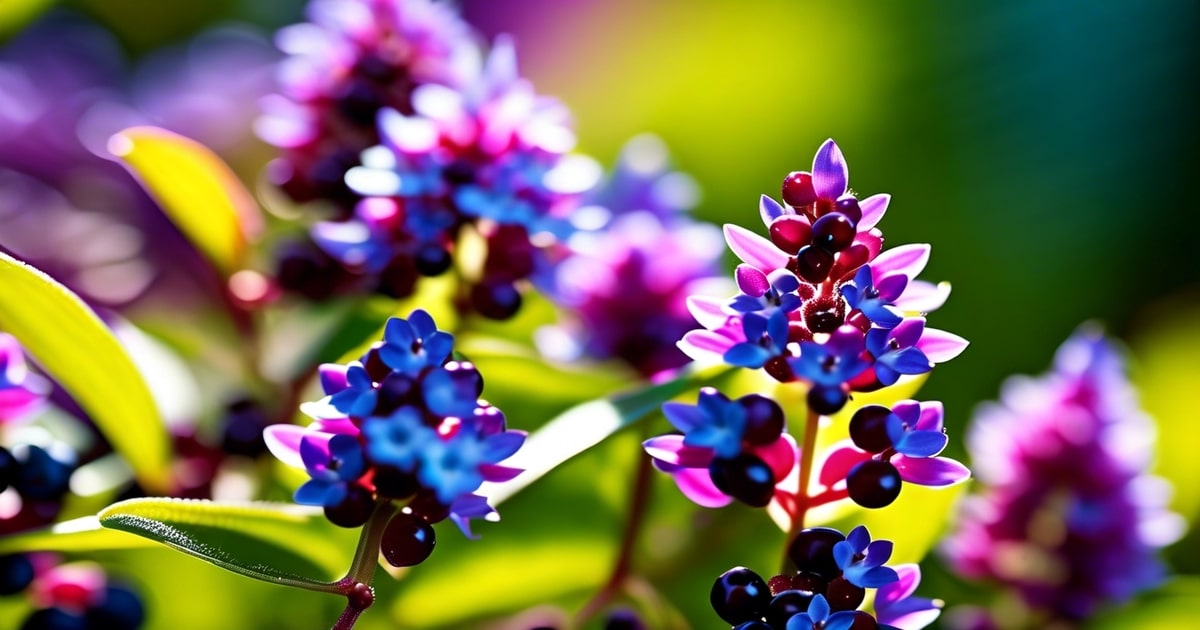Key Takeaways
- Chasteberry, premenstrual syndrome (PMS), mood swings, breast tenderness
- Women going through menopause might find relief from symptoms like hot flashes and night sweats by using chasteberry as a natural supplement and herbal remedy.
- If you are trying to conceive, consider using chasteberry, an herbal remedy, to potentially enhance fertility and regulate menstrual cycles, but always consult with a healthcare professional first.
- Be cautious when using chasteberry alongside birth control pills, as it may affect their effectiveness, leading to potential contraceptive failure.
- Individuals with hormone-sensitive conditions should exercise caution when using chasteberry, as it has the potential to interfere with these conditions.
- If you are taking dopamine-related medications, be aware that chasteberry could interact with them, affecting their efficacy.
- Chasteberry interactions can be serious.
Eases symptoms of premenstrual syndrome (PMS)
 Chasteberry, also known as Vitex agnus-castus, has been shown to alleviate the discomfort associated with premenstrual syndrome (PMS) symptoms. Some studies suggest that it may help reduce mood swings and offer relief from breast tenderness during PMS symptoms in women.
Research indicates that chasteberry may positively impact various symptoms of PMS in women. For instance, a study published in the “British Medical Journal” found that women who took chasteberry treatment experienced a significant reduction in PMS symptoms compared to those who received a placebo.
Moreover, another clinical trial revealed that chasteberry supplementation led to improvements in irritability, mood alterations, anger, headache, and breast fullness – all common manifestations of PMS symptoms.
According to the American Family Physician Journal, some evidence suggests that chaste berry can be effective in alleviating both physical and psychological symptoms related to menstrual irregularities in women.
Chasteberry, also known as Vitex agnus-castus, has been shown to alleviate the discomfort associated with premenstrual syndrome (PMS) symptoms. Some studies suggest that it may help reduce mood swings and offer relief from breast tenderness during PMS symptoms in women.
Research indicates that chasteberry may positively impact various symptoms of PMS in women. For instance, a study published in the “British Medical Journal” found that women who took chasteberry treatment experienced a significant reduction in PMS symptoms compared to those who received a placebo.
Moreover, another clinical trial revealed that chasteberry supplementation led to improvements in irritability, mood alterations, anger, headache, and breast fullness – all common manifestations of PMS symptoms.
According to the American Family Physician Journal, some evidence suggests that chaste berry can be effective in alleviating both physical and psychological symptoms related to menstrual irregularities in women.
May reduce menopause symptoms
Chasteberry, a popular herbal remedy, is believed to offer relief for menopausal symptoms in women. Research suggests that chaste may effectively reduce symptoms in menopausal women. This indicates the potential of chasteberry to alleviate the discomfort associated with these common menopausal symptoms in women. Moreover, some studies have proposed that chasteberry could aid women in managing mood changes during menopause. This is particularly significant as mood swings are prevalent among women going through this stage of life. The potential positive impact on mood offers promise for those seeking natural remedies for emotional fluctuations during menopause.May enhance fertility
 Chasteberry, an herbal supplement, has shown the potential to improve fertility among some women with support. It supports regulating menstrual cycles, which can positively impact fertility. Research suggests that chasteberry may enhance ovulation and reproductive health, providing support.
Women experiencing infertility or luteal phase defects might benefit from incorporating chasteberry into their dietary supplements to support their reproductive health. This natural herb could help support healthy levels of prolactin and the function of the corpus luteum, both essential for reproductive processes.
In a trial involving women with high prolactin levels, the use of chasteberry in combination with other herbal medicines demonstrated promising results in supporting fertility. The study indicated increased healthy ovulatory menstrual cycles among participants with support.
The potential benefits of chasteberry as an herbal supplement for enhancing fertility highlight its growing significance within the field of reproductive health. However, individuals considering this herb should consult healthcare professionals before incorporating it into their routine.
Chasteberry, an herbal supplement, has shown the potential to improve fertility among some women with support. It supports regulating menstrual cycles, which can positively impact fertility. Research suggests that chasteberry may enhance ovulation and reproductive health, providing support.
Women experiencing infertility or luteal phase defects might benefit from incorporating chasteberry into their dietary supplements to support their reproductive health. This natural herb could help support healthy levels of prolactin and the function of the corpus luteum, both essential for reproductive processes.
In a trial involving women with high prolactin levels, the use of chasteberry in combination with other herbal medicines demonstrated promising results in supporting fertility. The study indicated increased healthy ovulatory menstrual cycles among participants with support.
The potential benefits of chasteberry as an herbal supplement for enhancing fertility highlight its growing significance within the field of reproductive health. However, individuals considering this herb should consult healthcare professionals before incorporating it into their routine.
Potentially alters the effectiveness of birth control pills
Chasteberry, also known as Vitex agnus-castus, has raised concerns about its potential to interfere with the efficacy of birth control pills. Studies suggest that it may reduce the effectiveness of hormonal contraceptives. This interaction is particularly crucial for women using birth control pills, as it could impact their contraceptive protection. Women who are on birth control pills need to be cautious about potential interactions with chasteberry. Consulting a healthcare professional or pharmacist before incorporating chasteberry into their routine can provide valuable insights and guidance. In some cases, medical advice might be necessary to determine safe practices when using both chasteberry and hormonal contraceptives simultaneously. Individuals need to understand the effects of this interaction and take appropriate measures in consultation with healthcare providers.Can interfere with hormone-sensitive conditions
Chasteberry, also known as Vitex agnus-castus, has the potential to impact hormone-sensitive conditions such as breast cancer or endometriosis. This herb influences the pituitary gland, which affects the production of various hormones in the body. For individuals dealing with hormone-related health problems, it is crucial to be mindful of potential interactions that chasteberry may have. Since this herb can influence hormonal balance, those with hormone-related issues need to exercise caution when considering its use. Consulting a healthcare professional is strongly advised for individuals with hormone-sensitive conditions who are contemplating incorporating chasteberry into their wellness routine. Healthcare providers can provide personalized guidance based on an individual’s health needs and medical history.Possible interactions with dopamine-related medications
Chasteberry, also known as Vitex agnus-castus, may interact with medications influencing dopamine levels. This interaction can affect the efficacy of dopamine-related treatments and lead to unintended side effects. Individuals undergoing treatment involving drugs that impact dopamine function should exercise caution when considering the use of chasteberry. Since this herb has been associated with modulating dopamine activity, it is crucial for individuals taking such medications to consult their healthcare provider before using chasteberry. Consultation with a healthcare professional is highly recommended for those on dopaminergic treatments. This step is essential in thoroughly assessing potential interactions between chasteberry and dopamine-related medications. The importance of seeking medical advice before combining these substances cannot be overstated. Given the intricate nature of drug interactions, especially concerning neurotransmitter systems like dopamine, expert guidance plays a pivotal role in safeguarding patient well-being.Could affect medications metabolized by the liver
Chasteberry, also known as Vitex agnus-castus, can impact medications metabolized by the liver. This is due to its ability to influence certain enzymes in the liver responsible for drug metabolism. Individuals taking medications processed by the liver should be aware of potential interactions with chasteberry. Some common examples of drugs metabolized by the liver include statins, antihistamines, and some antidepressants. Consultation with a healthcare professional is advised for those on liver-metabolized medications and considering using chasteberry concurrently. A medical practitioner can provide personalized advice based on an individual’s medication regimen and health status. It’s important to note that while chasteberry may interact with these medications, not everyone will experience adverse effects. Nevertheless, it’s crucial to exercise caution and seek professional guidance before combining chasteberry with any prescription or over-the-counter drugs processed by the liver.May impact antipsychotic drug efficacy
Chasteberry, also known as Vitex agnus-castus, can potentially impact the effectiveness of antipsychotic medications. Research suggests that chasteberry may interfere with the way antipsychotic drugs work in the body, potentially affecting their efficacy. This interaction could lead to reduced therapeutic effects or unexpected side effects for individuals using both chasteberry and antipsychotics. Individuals taking antipsychotic medications must exercise caution regarding potential interactions with chasteberry. Consulting a healthcare provider is highly recommended for those who are on antipsychotic treatments and are considering using chasteberry supplements. Healthcare professionals can provide personalized advice based on an individual’s health conditions, current medications, and overall treatment plan. Understanding the possible interactions between chasteberry and antipsychotic drugs underscores the importance of informed decision-making. By staying informed about potential interactions and seeking professional guidance, individuals can better navigate their treatment journey while minimizing risks associated with drug interactions.Potential to interfere with Parkinson’s disease treatments
Chasteberry, also known as Vitex agnus-castus, can potentially interfere with treatments for Parkinson’s disease. Studies have suggested that chasteberry may affect dopamine levels in the brain, which is a key concern for individuals undergoing Parkinson’s disease treatments. Patients receiving therapies for Parkinson’s disease should be mindful of potential interactions between these treatments and chasteberry. Individuals managing this condition must consult a healthcare professional before incorporating chasteberry into their regimen. Consultation with a healthcare professional becomes even more critical due to the complex nature of Parkinson’s disease and its treatment. The individualized care healthcare professionals provide can help patients navigate potential interactions and make informed decisions about their treatment plans.Risk of reducing the efficacy of hormone replacement therapy
Chasteberry, when used concurrently with hormone replacement therapy, may diminish the effectiveness of the therapy. This is due to chasteberry’s potential to influence hormone levels. Individuals who are currently undergoing hormone replacement therapy should approach the use of chasteberry with caution and seek guidance from a healthcare professional. They must discuss any potential interactions between chasteberry and their ongoing hormone replacement treatment. Consultation with a healthcare provider is highly recommended for those on hormone replacement therapy considering adding chasteberry as part of their regimen. Healthcare professionals can provide personalized advice based on an individual’s health condition and medical history.Frequently Asked Questions
Is chasteberry safe to use for women experiencing premenstrual syndrome (PMS)?
Chasteberry may help ease symptoms of PMS, but it’s essential to consult a healthcare professional before using it, especially if you are on other medications or have underlying health conditions. Research its potential interactions and effects on your specific situation.Can chasteberry be used to enhance fertility?
Chasteberry is believed to have properties that may enhance fertility, but its effects can vary from person to person. It’s crucial to discuss with a healthcare provider before using it for this purpose, particularly if you’re undergoing fertility treatments or taking other medications.Does chasteberry interact with birth control pills?
Chasteberry has the potential to alter the effectiveness of birth control pills. If you’re considering using chasteberry while on birth control, consult your healthcare provider about potential interactions and alternative contraceptive methods.What are the potential health benefits of using Chasteberry for hormonal balance?
Chasteberry is known for its hormonal balance benefits and has been used for centuries to support women’s health. This natural remedy may help reduce symptoms of PMS, menopause, and hormonal imbalances. Research suggests that Chasteberry can help regulate menstrual cycles and alleviate symptoms such as mood swings and bloating.

